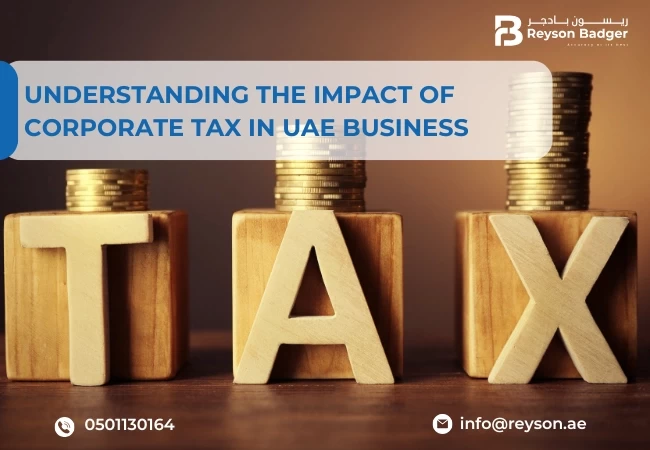Understanding the Impact of Corporate Tax in UAE Businesses
Written By Akshaya Ashok, Reviewed By Reyees K P
Published on 18/01/2025

The United Arab Emirates (UAE) is changing its tax system by introducing a corporate tax. This is a big shift in how the country handles money. Companies in the UAE need to get used to this new tax rule. Businesses need to understand how corporate tax will affect them. They need to be aware of these changes to stay compliant and competitive. This new tax could impact many areas, like financial reporting, tax planning, and cash flow.
As businesses in the UAE deal with this new tax system, they should learn its details. Knowing how these tax changes will affect them is key to doing well in this new situation.
What is Corporate Tax in the UAE?
Corporate tax is a direct tax levied on the net income or profit of corporations and other business entities. It aims to ensure that businesses contribute to public finances, aligning with global practices of tax compliance and transparency. The introduction of corporate tax in the UAE marks a significant shift from its previous tax-free status, reflecting an effort to enhance fiscal sustainability and attract foreign investment by adhering to international standards.
Overview of the New Corporate Tax Regime
The UAE's corporate tax regime was implemented effective from June 1, 2023, with a headline rate of 9% applicable to taxable income exceeding AED 375,000. Income below this threshold is taxed at 0%. This structure is designed to support small businesses while ensuring that larger corporations contribute fairly to the economy.
Key Features:
Tax Rates:
- 0% on taxable income up to AED 375,000.
- 9% on taxable income exceeding AED 375,000.
Applicability:
- Applies to both resident and non-resident entities earning income in the UAE.
Timeline:
- The law was officially announced on December 9, 2022, and became effective for financial years starting June 1, 2023.
Alignment with Global Tax Trends
The UAE's move to implement corporate tax aligns with international efforts, particularly the OECD's Base Erosion and Profit Shifting (BEPS) initiative. This initiative seeks to curb tax avoidance by multinational corporations and enhance transparency in global taxation practices. By adopting a corporate tax system, the UAE aims to position itself as a compliant and attractive destination for international business.
Impact on Profit Margins
Corporate tax will significantly influence profitability for businesses operating in the UAE:
- Profitability Effects: Businesses with net profits above AED 375,000 will incur a 9% tax, impacting overall profit margins.
- Reassessing Strategies: Companies may need to adjust their pricing strategies and operational costs to maintain profitability post-taxation. This could involve increasing prices or finding efficiencies in operations.
- Differential Impact: Businesses with low-profit margins may feel a more substantial impact than those with higher margins. For instance: A company with a net profit of AED 500,000 would pay AED 11,250 in corporate tax.
Changes in Business Strategies
The corporate tax landscape necessitates strategic adjustments for businesses:
- Adjusting Strategies: Companies must adapt their strategies to navigate the implications of corporate tax. This includes re-evaluating investment plans and capital expenditures to align with the new financial realities.
- Resource Allocation: Businesses may need to reassess how they allocate resources, focusing on areas that can yield better returns under the new tax regime. This could involve prioritizing investments that offer greater tax efficiency.
- Importance of Tax Planning: Effective tax planning and forecasting become crucial for businesses to manage their liabilities and optimize their financial strategies in light of corporate taxation.
Impact on Free Zone Companies
Free zone businesses are also affected by the new corporate tax regime:
- Tax Exemption Status: Historically, many free zone companies enjoyed tax exemptions, but the introduction of corporate tax raises questions about their future status under this regime.
- Effects on Operations: Companies operating in free zones may need to adjust their business models to maintain tax efficiency while complying with the new regulations. This could involve restructuring or changing operational practices to align with compliance requirements.
Impact on Foreign Investment
Corporate tax influences foreign investment dynamics in the UAE:
- Investment Destination Appeal: The introduction of corporate tax may alter perceptions of the UAE as an investment destination. While it adds a layer of complexity, it also aligns the UAE more closely with global norms, potentially attracting investors seeking stability and transparency.
- Role of Tax Treaties: Existing tax treaties and exemptions will play a significant role in determining how attractive the UAE remains for foreign investors. These agreements can mitigate some of the impacts of corporate taxation, enhancing the investment landscape.
- Foreign Business Decisions: The new tax regime might influence foreign businesses' decisions regarding expansion into or continued operations within the UAE market. Companies will need to evaluate how corporate taxes affect their overall profitability and strategic goals.
Compliance and Administrative Burdens
The introduction of corporate tax increases compliance requirements for businesses:
- Administrative Burden: Businesses will face increased administrative responsibilities to comply with new tax laws, including maintaining accurate accounting records and timely corporate tax filing of returns.
- Importance of Systems: Establishing robust accounting and reporting systems is essential for managing compliance effectively. This is particularly critical for small and medium-sized enterprises (SMEs), which may struggle with the additional administrative load.
- Challenges for SMEs: SMEs might face unique challenges in navigating these compliance requirements due to limited resources and expertise, making it crucial for them to seek guidance and support from tax professionals.
How Corporate Tax Will Affect Different Industries in the UAE?
The introduction of corporate tax in the UAE is expected to have varied impacts across different sectors, each facing unique challenges and opportunities.
Impact on Various Sectors
- Technology: The tech sector may benefit from favorable tax treatment as the UAE aims to diversify its economy. Companies in this field might find opportunities for innovation and growth, but they will also need to navigate new compliance requirements under the corporate tax regime.
- Finance: Financial institutions, including banks and investment firms, will face a direct impact due to the corporate tax on profits exceeding AED 375,000. This could lead to increased operational costs and necessitate adjustments in pricing strategies to maintain profitability.
- Real Estate: The real estate sector will be subject to corporate tax on net income, which may affect profit margins. However, the demand for real estate in the UAE remains strong, providing opportunities for growth despite the additional tax burden.
- Manufacturing: Manufacturing companies may experience mixed effects. While they will need to account for corporate tax in their financial planning, potential incentives for local production could mitigate some of the impacts. Strategic investments in technology and efficiency may also help offset tax liabilities.
Sector-Specific Tax Challenges and Opportunities
Each sector will need to adapt its strategies to optimize tax outcomes:
- Technology: Leveraging R&D incentives and exploring free zone benefits can enhance competitiveness.
- Finance: Implementing robust tax compliance frameworks will be crucial to managing increased scrutiny.
- Real Estate: Strategic property management and development planning can help mitigate tax impacts.
- Manufacturing: Investing in sustainable practices may qualify for additional incentives or deductions.
Tax Planning and Optimization Strategies for UAE Businesses
To effectively manage the implications of corporate tax, businesses should adopt best practices in tax planning and optimization.
Best Practices for Minimizing Corporate Tax Impact
- Optimize Deductions: Ensure that all allowable expenses are claimed, including operational costs and capital expenditures. Businesses should structure their activities to maximize available deductions.
- Utilize Free Zone Benefits: Companies operating in free zones can take advantage of specific incentives designed to promote economic activity. Understanding eligibility criteria for exemptions is essential for optimizing tax liabilities.
- Stay Informed on Regulations: The corporate tax landscape is evolving; staying updated on changes ensures compliance and helps businesses adapt their strategies accordingly.
Effective Tax Planning
- Long-Term Forecasting: Developing comprehensive financial forecasts that incorporate potential tax liabilities can aid in strategic decision-making.
- Resource Allocation: Re-evaluating how resources are allocated can enhance operational efficiency while minimizing taxable income.
Role of Professional Tax Advisors
Engaging professional tax advisors is vital for navigating the complexities of corporate tax:
- They provide insights into optimizing corporate structures and ensuring compliance with local regulations.
- Advisors can assist in identifying potential deductions, credits, and exemptions that businesses might overlook.
- Their expertise is invaluable in strategic planning, helping companies align their operations with both current and anticipated regulatory changes.
Future Trends: The Evolution of Corporate Tax in the UAE
The introduction of corporate tax in the UAE marks a significant shift in the country's fiscal policy, and its landscape is expected to continue evolving in response to changing economic conditions, global tax trends, and business needs. Here are some potential future trends and their long-term effects on businesses and the economy:
Expected Evolution of Corporate Tax Landscape
- Increased Tax Complexity: As the corporate tax regime matures, it is likely to become more complex, with additional regulations, guidelines, and interpretations.
- Tax Rates and Exemptions: The UAE may adjust tax rates or exemptions to maintain competitiveness, attract foreign investment, or address specific economic challenges.
- Transfer Pricing and BEPS: The UAE may introduce transfer pricing regulations and adopt Base Erosion and Profit Shifting (BEPS) measures to combat tax avoidance.
- Digital Taxation: The UAE may introduce digital taxation measures to address the challenges posed by the digital economy.
Long-term Effects on Businesses and the Economy
- Increased Compliance Burden: Businesses will need to invest in tax compliance, potentially increasing their operational costs.
- Changes in Business Structures: Companies may restructure their operations to optimize tax efficiency, potentially leading to changes in employment, investment, and supply chain management.
- Impact on Foreign Investment: The UAE's corporate tax regime may influence foreign investment decisions, potentially affecting the country's economic growth and competitiveness.
- Economic Diversification: The introduction of corporate tax may accelerate economic diversification efforts, as the government seeks to reduce its reliance on oil revenues.
Possible Adjustments and Reforms
- Tax Incentives: The UAE may introduce tax incentives to attract specific industries, such as technology or renewable energy.
- Free Zone Reforms: The UAE may reform its free zone regime to maintain its competitiveness, potentially introducing new tax incentives or relaxations.
- Tax Dispute Resolution: The UAE may establish a tax dispute resolution mechanism to provide certainty and clarity for businesses.
- International Tax Cooperation: The UAE may strengthen its international tax cooperation, potentially leading to increased exchange of information and tax compliance.
Conclusion
Corporate tax in the UAE is a big change. Businesses need to get used to it. Knowing how this tax affects companies in the UAE is very important. It helps with following the rules and coming up with smart tax plans. As companies adjust to these tax changes, it's smart to get help from experts, like Reyson Badger. They can offer useful tips and support. Staying updated and taking action can help businesses grow and succeed in the busy UAE market.

Written By
Akshaya Ashok
Akshaya Ashok is a content writer specializing in creating content focused on accounting and auditing. With over two years of experience, she has developed expertise in crafting professional content for the financial sector.

